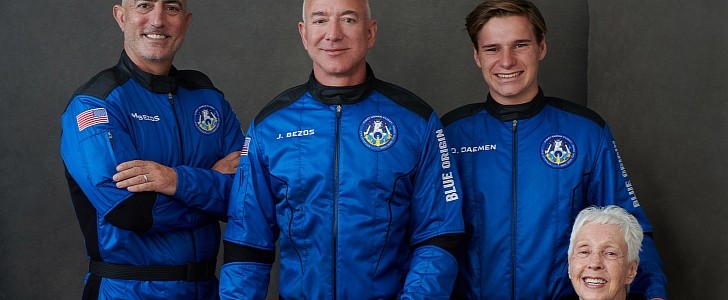CLOSED CLUB START YOUR OWN
FAA Changes Astronaut Definition, Disqualifying Jeff Bezos and Richard Branson
July was the month of billionaires launching themselves to the edge of space on their own ships and calling it “work” to the benefit of the entire human race. Be that as it may, but these billionaires are still not astronauts in the eyes of the Federal Aviation Administration (FAA).
Ironically, on July 9, Blue Origin pointed out the differences between its New Shepard rocket and the Virgin Galactic spaceplane Unity 22, and how not a single member of the crew of the former had “an asterisk next to their name” and the astronaut title, like the crew from latter did. The difference was in the fact that New Shepard would fly above the Kármán line, reaching an altitude of 62 miles (100 km). Branson, by comparison, only reached 50 miles (80 km), so he didn’t really go to space.
According to the FAA, Bezos doesn’t get bragging rights as an astronaut just because he flew higher, so he’d better put that asterisk back. In the first revision since it established the Commercial Astronaut Wings program in 2004, the FAA has narrowed down the definition of “astronaut” so as to rule out future billionaires whose idea of space exploration amounts to joyrides in suborbital space.
One of the conditions for someone to get their astronaut wings from the FAA is that they travel 50 miles (80 km) above Earth, and both Bezos and Branson have met it. But the FAA is now saying that would-be astronauts must also have “demonstrated activities during flight that were essential to public safety, or contributed to human space flight safety,” and neither meets this requirement. The change went into effect on July 20, the very day when Bezos made the inaugural 11-minute flight on the reusable rocket New Shepard.
Both Bezos and Branson have talked a great deal about how their space launches are for the benefit of mankind and might even, in some yet-to-be-explained way, help us solve all of our pressing problems here on Earth. Realistically speaking, if that is the case, it won’t become apparent for many years to come, when space travel becomes norm. For the time being, both missions were just experimental launches and very expensive joyrides.
As such, the FAA will not be awarding Bezos or Branson their astronaut wings anytime soon. It’s a good thing then that their companies designed their own, which they started wearing right after touchdown. That said, they could apply for an honorary set of wings from the FAA, but as of the moment of writing, no application on their behalf has been submitted.
According to the FAA, Bezos doesn’t get bragging rights as an astronaut just because he flew higher, so he’d better put that asterisk back. In the first revision since it established the Commercial Astronaut Wings program in 2004, the FAA has narrowed down the definition of “astronaut” so as to rule out future billionaires whose idea of space exploration amounts to joyrides in suborbital space.
One of the conditions for someone to get their astronaut wings from the FAA is that they travel 50 miles (80 km) above Earth, and both Bezos and Branson have met it. But the FAA is now saying that would-be astronauts must also have “demonstrated activities during flight that were essential to public safety, or contributed to human space flight safety,” and neither meets this requirement. The change went into effect on July 20, the very day when Bezos made the inaugural 11-minute flight on the reusable rocket New Shepard.
Both Bezos and Branson have talked a great deal about how their space launches are for the benefit of mankind and might even, in some yet-to-be-explained way, help us solve all of our pressing problems here on Earth. Realistically speaking, if that is the case, it won’t become apparent for many years to come, when space travel becomes norm. For the time being, both missions were just experimental launches and very expensive joyrides.
As such, the FAA will not be awarding Bezos or Branson their astronaut wings anytime soon. It’s a good thing then that their companies designed their own, which they started wearing right after touchdown. That said, they could apply for an honorary set of wings from the FAA, but as of the moment of writing, no application on their behalf has been submitted.
Download attachment: FAA revision of the "astronaut" definition (PDF)








No comments:
Post a Comment